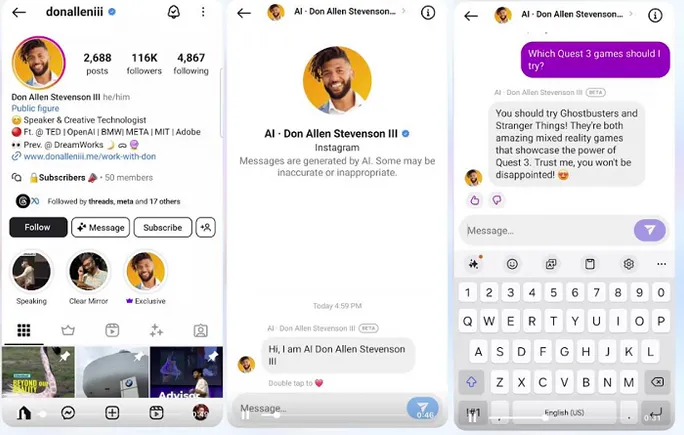It’s been in development for a while, but today Meta released the first phase of its “AI Studio” platform, which lets Instagram creators build AI versions of themselves that can interact with fans via DMs.

As you can see from this example, Meta’s custom AI bot, which is currently in beta and undergoing limited testing with select creators, can answer questions in the style of the account.
AI bots will have a star icon in the messages tab to indicate that this is a bot response stream, and there will also be a disclaimer note in the chat explaining that it is an AI bot you are interacting with.
So it should be pretty clear to everyone that they’re not talking to a real person or account owner. But then again…
Meta CEO Mark Zuckerberg made the announcement during an interview with YouTuber Kayne Sutter, in which he also discussed various elements of Meta’s broader AI plans.
Most of Zuckerberg’s comments are pretty vague and broad, with a few hinting at upcoming AI updates (improved translation, hologram-like projections of real people in VR).
But the main announcement is the start of live testing of AI Studio with select IG creators in the US.
Zuckerberg says AI Studio lets creators build “AI agent” versions of themselves to interact with their community, and the process, built into Instagram (recently discovered by app researcher Alessandro Paluzzi), offers a range of prompts and tools to generate variations of these AI bots.

Zuckerberg said the main focus, or simple use case, will be answering factual queries, with more creative answers, or answers that replicate the creator’s style, coming with a harder element. Creators will be free to train the bot on different aspects of their social media presence, Zuckerberg said, which will allow it to generate a more lifelike replica of themselves.
But as mentioned above, Meta also doesn’t want to deceive people into thinking they’re interacting with a real human. Zuckerberg said the AI disclosure element is still being worked on, but there are various indications in the stream.

But the bigger question I have is “why?” Why would people want to engage with a bot that sounds like a celebrity when they’re not actually engaging with a human at all?
I mean, I get the basic use case of a creator getting a ton of questions and having limited time to personally respond — that’s a factual element, and the bot would be able to provide generic answers to basically generic questions, in the creator’s style — but expanding into other areas seems inherently deceptive and counter to the whole focus of a “social” media platform.
right?
Sutter asked the same question in his interview with Zuckerberg, noting that creators and viewers would be worried about losing real connections in media. Zuckerberg downplayed that a bit in his response, but the reality is that there doesn’t seem to be any real value in having AI bots that simulate real people, especially within apps that value real connections.
This seems like a step away from the core use case of social and towards a platform where bots interact with bots, and real humans are replaced by automated interactions.
Haven’t users been complaining about bots for years? Haven’t dishonest interactions always been a problem on social apps? And now we’re not only encouraging them, but using them directly in place of humans.
Is it because the technology is better and more persuasive now? Is that why people have always been annoyed by bots?
I’m not sure, but it doesn’t seem like the right way to lean into the AI trend, but Meta, for some reason, seems convinced that robotic versions of celebrities and influencers would be a valuable addition.
Zuckerberg also noted that eventually, companies will be able to create UGC AI characters that can interact with people in different ways and styles.
But is there actual demand for this? Does it add value?
It’s unclear if Meta’s initial experiment with celebrity-inspired bots was truly successful, but they’re pushing it, which will likely lead to even more engagement for approved bots in streams.


